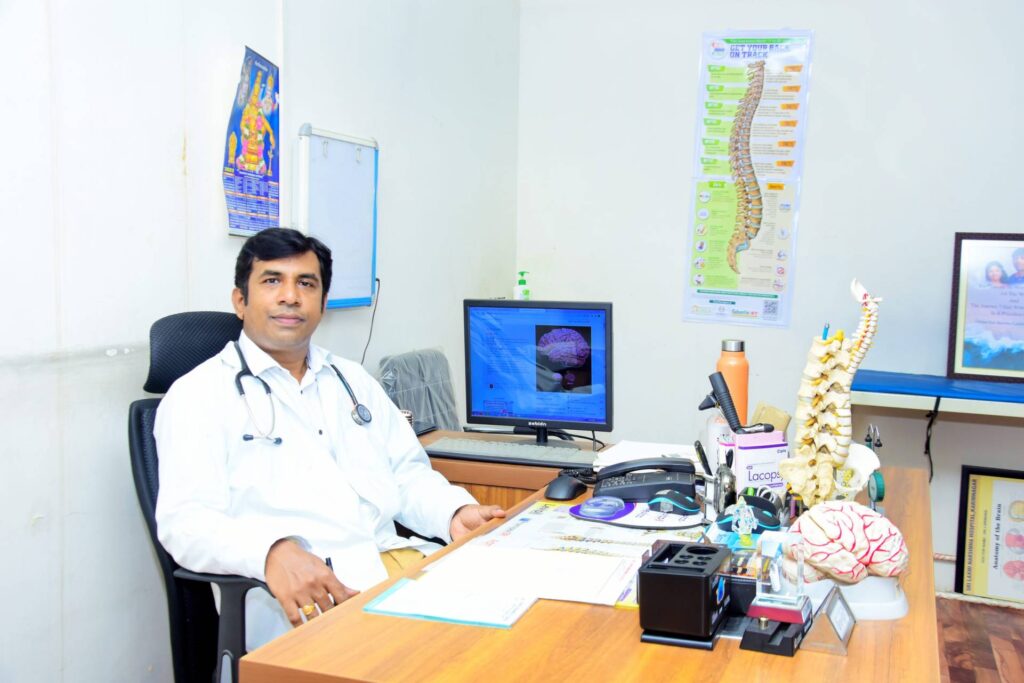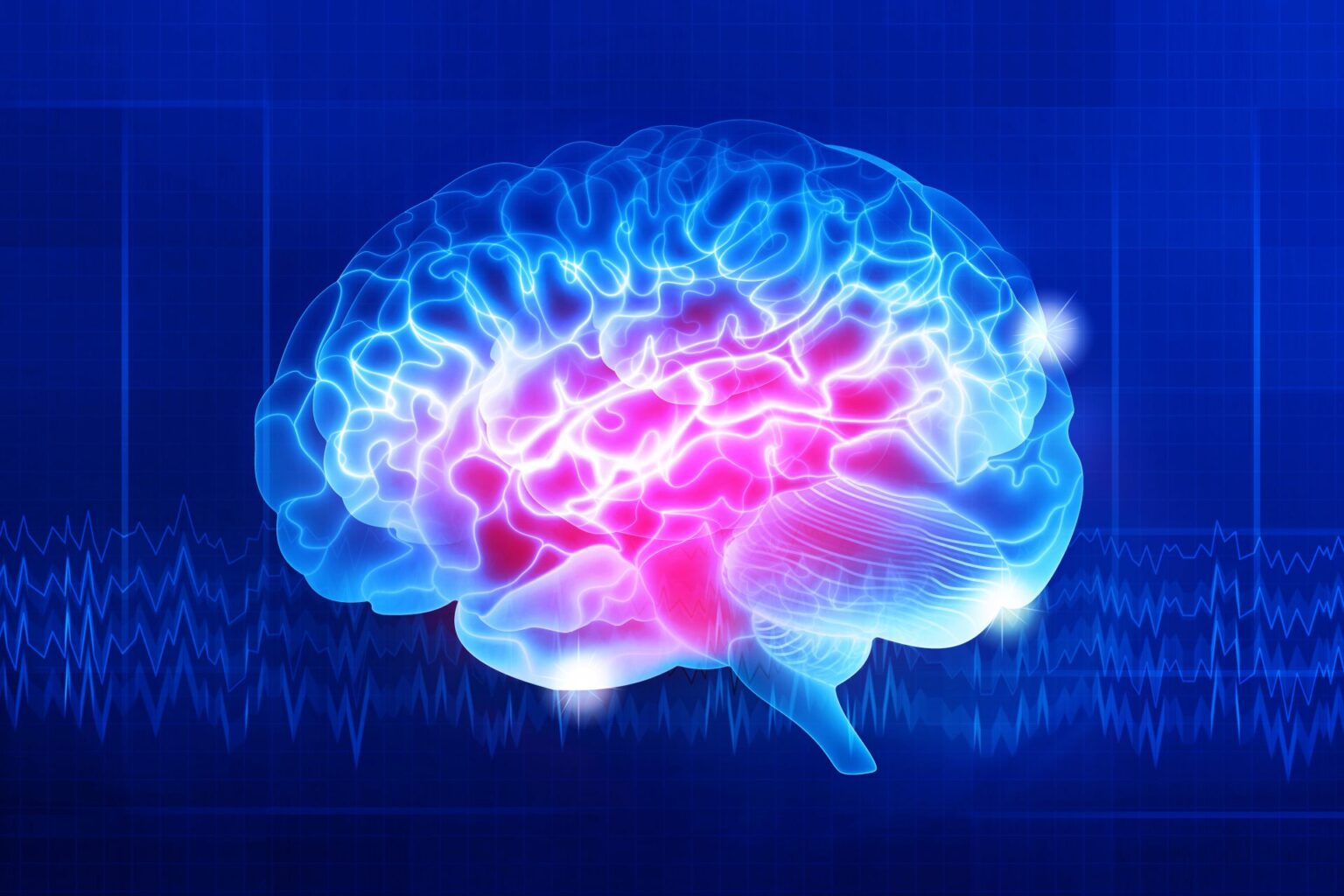- DEPARTMENT
- MEDICAL ONCOLOGY
- SURGICAL ONCOLOGY
- NEPHROLOGY
- UROLOGY
- MEDICAL GASTROENTEROLOGY
- SURGICAL GASTROENTEROLOGY
- NEUROLOGY
- NEURO SURGERY
- PEDIATRIC SURGERY
- PLASTIC SURGERY
- CARDIOLOGY
- GENERAL SURGERY
- ORTHOPEDICS
- OBSTETRICS & GYNECOLOGY
- GENERAL MEDICINE
- PEDIATRICS
- PULMONOLOGY
- DERMATOLOGY
- ENT
- MAXILLOFACIAL SURGEON
- DENTAL SCIENCES
- ANAESTHESIA & CRITICAL CARE
- EMERGENCY MEDICINE & TRAUMA
- PAIN MANAGEMENT
- PATHOLOGY
- PHYSIOTHERAPY
NEURO SURGERY

Dr. J. Srinivas
MBBS,MS,MCH
Neurosurgery, a highly specialized field within medicine, focuses on the surgical treatment of disorders affecting the central and peripheral nervous systems, including the brain, spinal cord, and peripheral nerves. Neurosurgeons are skilled practitioners who possess expertise in the diagnosis, management, and surgical intervention of a wide range of neurological conditions, ranging from brain tumors and spinal cord injuries to cerebrovascular disorders and functional neurological disorders. In this comprehensive examination, we will delve into the multifaceted realm of neurosurgery, exploring its history, significance, procedures, and advancements.
Understanding Neurosurgery
Historical Perspectives
The origins of neurosurgery can be traced back to ancient civilizations, where primitive surgical techniques were used to treat head injuries, cranial fractures, and neurological disorders. Ancient healers and physicians, such as the Hippocratic physicians in ancient Greece and the Edwin Smith Surgical Papyrus in ancient Egypt, documented early surgical interventions for cranial trauma and neurological ailments. Over time, neurosurgery evolved as a distinct medical specialty, with significant advancements in surgical techniques, anesthesia, and neuroimaging contributing to improved patient outcomes and expanded treatment options for neurological conditions.
Scope of Practice
Neurosurgery encompasses a broad spectrum of surgical procedures and interventions, addressing various anatomical regions and clinical concerns:
Cranial Neurosurgery
Brain Tumors: Neurosurgeons diagnose and treat brain tumors, including gliomas, meningiomas, pituitary adenomas, and metastatic brain tumors, utilizing techniques such as craniotomy, tumor resection, stereotactic radiosurgery (e.g., gamma knife, CyberKnife), and intraoperative neuro-navigation to achieve maximal tumor removal while preserving neurological function.
Cerebrovascular Disorders: Neurosurgeons manage cerebrovascular disorders such as intracranial aneurysms, arteriovenous malformations (AVMs), and cerebral hemorrhage, performing surgical interventions such as aneurysm clipping, AVM resection, endovascular embolization, and bypass surgery to prevent hemorrhage, reduce neurological deficits, and improve patient outcomes.
Epilepsy Surgery: Neurosurgeons evaluate and treat medically refractory epilepsy through surgical interventions such as temporal lobectomy, hemispherectomy, and corpus callosotomy, aiming to localize and resect epileptogenic foci while preserving essential neurological function and reducing seizure frequency and severity.
Spinal Neurosurgery
Spinal Disorders: Neurosurgeons manage spinal disorders such as degenerative disc disease, spinal stenosis, herniated discs, and spinal cord tumors, utilizing surgical techniques such as laminectomy, discectomy, spinal fusion, and spinal cord decompression to relieve nerve compression, stabilize the spine, and restore spinal alignment and function.
Spinal Trauma: Neurosurgeons treat spinal cord injuries, vertebral fractures, and spinal instability resulting from traumatic accidents or falls, performing spinal fusion, vertebral stabilization, and decompressive laminectomy procedures to stabilize the spine, prevent neurological deterioration, and promote neurological recovery.
Peripheral Nerve Surgery: Neurosurgeons manage peripheral nerve disorders such as carpal tunnel syndrome, peripheral nerve tumors, and brachial plexus injuries, utilizing surgical techniques such as nerve decompression, nerve grafting, and nerve transfer to restore sensory and motor function and alleviate neuropathic pain.
Functional Neurosurgery
Movement Disorders: Neurosurgeons treat movement disorders such as Parkinson’s disease, essential tremor, and dystonia through deep brain stimulation (DBS) surgery, implanting electrodes within specific brain nuclei to modulate neural activity and alleviate motor symptoms and dyskinesias.
Pain Management: Neurosurgeons perform surgical interventions for chronic pain conditions such as trigeminal neuralgia, failed back surgery syndrome, and complex regional pain syndrome (CRPS), utilizing techniques such as spinal cord stimulation, dorsal root ganglion stimulation, and motor cortex stimulation to disrupt pain pathways and provide long-term pain relief.
Psychiatric Disorders: Neurosurgeons explore neuromodulation therapies for psychiatric disorders such as obsessive-compulsive disorder (OCD), depression, and addiction, utilizing techniques such as deep brain stimulation (DBS), vagus nerve stimulation (VNS), and transcranial magnetic stimulation (TMS) to modulate neural circuits and improve psychiatric symptoms and functional outcomes.
Pediatric Neurosurgery
Congenital Malformations: Neurosurgeons manage congenital malformations of the central nervous system, such as spina bifida, hydrocephalus, and craniosynostosis, through surgical interventions such as ventriculoperitoneal (VP) shunt placement, endoscopic third ventriculostomy (ETV), and cranial vault reconstruction to alleviate hydrocephalus, restore normal cranial growth, and prevent neurological sequelae.
Pediatric Brain Tumors: Neurosurgeons diagnose and treat pediatric brain tumors, including medulloblastoma, ependymoma, and gliomas, utilizing surgical resection, chemotherapy, and radiation therapy to achieve tumor control, preserve neurological function, and improve long-term survival and quality of life for pediatric patients.
Pediatric Epilepsy Surgery: Neurosurgeons perform epilepsy surgery in pediatric patients with medically refractory epilepsy, employing techniques such as hemispherectomy, corpus callosotomy, and focal cortical resection to localize and resect epileptogenic foci while minimizing neurological deficits and cognitive impairments.
Surgical Techniques and Innovations
Neurosurgery encompasses a wide range of surgical techniques and innovations:
Microsurgery: Microsurgery involves the use of high-powered surgical microscopes and specialized instruments to perform precise, intricate surgical procedures with magnification and illumination, enabling meticulous dissection, tissue manipulation, and vessel anastomosis in delicate neurological structures.
Minimally Invasive Surgery: Minimally invasive neurosurgery utilizes small incisions, endoscopes, and specialized instruments to access intracranial and spinal targets while minimizing tissue trauma, blood loss, and postoperative morbidity, offering advantages such as shorter hospital stays, faster recovery times, and improved cosmetic outcomes for patients.
Image-Guided Surgery: Image-guided neurosurgery integrates advanced imaging modalities such as intraoperative MRI, CT, and neuronavigation systems to provide real-time, three-dimensional visualization of intracranial and spinal anatomy, facilitating accurate localization, precise surgical planning, and optimal tumor resection or tissue biopsy.
Stereotactic Radiosurgery: Stereotactic radiosurgery (SRS) delivers high-dose radiation therapy to intracranial targets with submillimeter accuracy and precision, utilizing techniques such as gamma knife, CyberKnife, and linear accelerator-based systems to treat brain tumors, arteriovenous malformations (AVMs), trigeminal neuralgia, and other neurological disorders without open surgery.
Postoperative Care and Rehabilitation
Postoperative care and rehabilitation are essential aspects of the neurosurgical process:
Intensive Care Unit (ICU) Monitoring: Patients undergoing complex neurosurgical procedures may require postoperative care in the intensive care unit (ICU) for close monitoring of vital signs, neurological status, intracranial pressure (ICP), and fluid balance, with specialized nursing care and multidisciplinary support to optimize recovery and prevent complications.
Pain Management: Neurosurgeons provide postoperative pain management to alleviate surgical discomfort and promote patient comfort and well-being, utilizing multimodal analgesic techniques such as intravenous opioids, epidural analgesia, patient-controlled analgesia (PCA), and regional anesthesia to optimize pain control and minimize opioid-related side effects.
Neurological Monitoring: Neurosurgeons perform postoperative neurological monitoring to assess neurological function, mental status, cranial nerve function, motor strength, sensation, reflexes, and coordination, identifying any signs of neurological deterioration or surgical complications that require prompt intervention or escalation of care.
Rehabilitation Services: Patients undergoing neurosurgery may require rehabilitation services such as physical therapy, occupational therapy, speech therapy, and neuropsychological rehabilitation to maximize functional recovery, regain independence, and improve activities of daily living (ADLs) following surgery, with customized treatment plans tailored to individual patient needs and goals.
